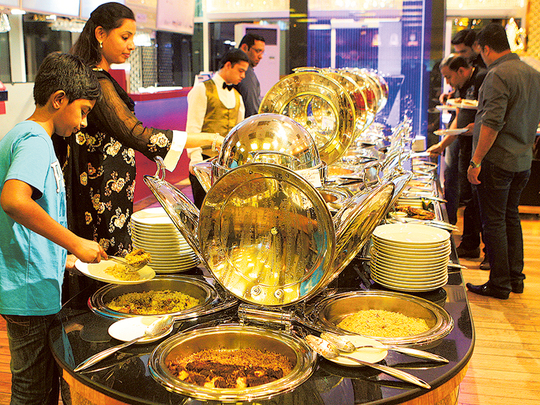
Dubai: Customers are for the most part happy with the hygiene standards in food outlets in Dubai but have voiced their concern over some practices they think should be looked into.
Common concerns among residents in Dubai when eating outside are mostly linked to the preparation and handling of food, cleanliness of utensils and the personal hygiene of the person serving the food.
Gulf News spoke to a few residents about their top concerns and negative experiences with different food outlets and how they dealt with specific problems that bothered them.
The majority of responses revealed their confidence in Dubai Municipalitys’ efforts in ensuring food outlets are complying with the hundreds of food safety rules, but a few practices they have come across at specific restaurants in Dubai, they say, can be viewed as unhygienic and can pose a health risk to consumers.
A common concern is the utensils not being clean.
Marla Ebrahim, 22, from Syria, said she’s not usually picky about what might be hygienic and unhygienic when eating at any food outlet in Dubai, but what bothers her most is when the cups are not washed properly and smudges and food residues can be clearly spotted.
“It’s not very usual here, but in some busy restaurants during weekends it happens and I feel very disgusted and ask them to change the plates and cups on the table. I believe there is something wrong being done during the process of washing and drying, or maybe they haven’t put enough detergent,” said Marla.
Sharing the same concern was Salma Khalifa, an American University of Sharjah student, who suffered from food poisoning once after eating at a fast food chain in Dubai.
“I had food poisoning because I ate something that was not cooked well or had expired. These are things we cannot take precautions against and only get affected later. Usually we rely on what we see or smell to judge whether the place is following hygienic practices or not. A common problem is with the lack of cleanliness of the plates, forks, cups and knives. When you’re about to drink water and you detect a bad odour in the cup, that’s what angers a customer the most,” said Salma.
According to Dubai Municipality’s Food Code, which is available for all food outlets to help them comply with food safety rules, a whole section deals with how utensils should be washed in a way that fully removes contaminants such as food residues, dirt, grease and bacterial film from a surface, which is achieved by the use of water and proper detergent.
Utensils and equipment should be disinfected, either mechanically or manually, after cleaning, to minimise the risk of food becoming contaminated with microorganisms when coming into contact with the utensils or equipment.
Omar Sa’ad Al Sayed from Egypt believes the problem is present in fast food chains when it comes to the trays in which the food is placed.
“The trays are probably the dirtiest and contain lots of bacteria because when the food is being dumped in the bin, the tray goes halfway into the bin. The cloth they use to clean the tray is used all day and, to me, this is my big concern,” said Sayed.
As for the issue of food not being cooked well, it tops Sayed’s and Salma’s concerns as well. The Food Code states that raw foods of animal origin and food mixtures containing raw foods of animal origin shall be cooked “until core temperature is at least 75°C or to a time and temperature that would give an equivalent pathogen reduction”.
“It’s quite worrying when the meat or chicken is not grilled or cooked well, which is why I ask them to make sure my steak is well done,” said Sayed.
Salma voiced her concern over the hands of the waiter or waitress not being clean. She believes the person serving and cooking the food should always wear gloves.
The Food Code also deals with those who come into contact with food and how they should maintain an appropriate degree of personal cleanliness.
Peter Zekry, who works at a pharmaceutical company, said he is sceptical about how hygienic cafeterias are most of the time.
“Compared to the country I come from, I’m extremely satisfied with the hygiene standards at restaurants here. I specifically question whether there is any contaminations in the garlic mayonnaise or pickles at cafeterias, but it hasn’t stopped me from eating there,” Zekry said.
Recalling an incident when his sister found worms in the lettuce of her salad, he said, “Vegetables not being washed properly is a problem also because they can contain many insects that can end up in the person’s stomach”.













